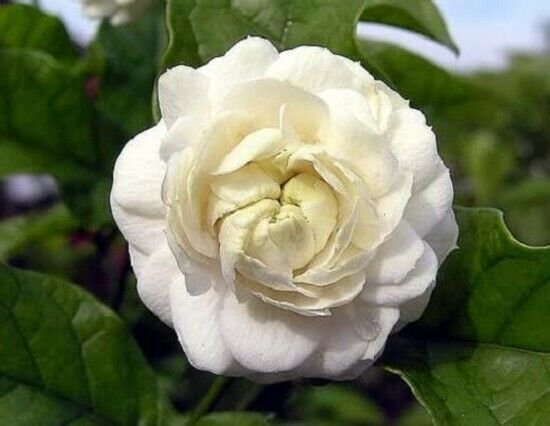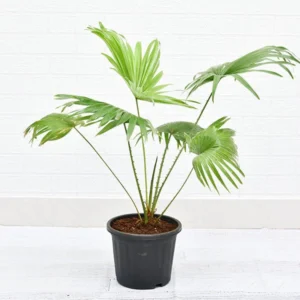Description
JASMINE (Bondumalli) – A 1000-Word Description
Introduction
Jasmine, known as Bondumalli in several South Indian languages, especially Telugu and Tamil, is a fragrant flowering plant widely loved for its beautiful white blossoms and intoxicating aroma. Belonging to the genus Jasminum under the family Oleaceae, jasmine holds a cherished place in gardens, rituals, perfumes, and traditional medicine across the world.
Botanical Overview
- Scientific Name: Jasminum sambac (commonly referred to as Arabian Jasmine)
- Family: Oleaceae
- Genus: Jasminum
- Common Names: Jasmine, Arabian Jasmine, Mogra, Mallige, Malli Poo, Bondumalli
The Jasmine genus includes around 200 species, but Jasminum sambac is the most popularly cultivated for its rich scent and aesthetic appeal.
Physical Characteristics
Jasmine plants are typically evergreen shrubs or climbers. The Bondumalli variety, especially Jasminum sambac, is a relatively small shrub that can grow up to 1–3 meters in height. It is characterized by:
- Leaves: The leaves are ovate to elliptic, glossy green, and arranged oppositely. They measure 4–12 cm in length.
- Flowers: The star attraction of the plant, the flowers are white, highly fragrant, and borne in clusters. Each bloom consists of 5–9 petals and opens at night, releasing a powerful sweet scent.
- Fruit: The fruit is a small black berry, not typically used or cultivated for human consumption.
- Growth Habit: It thrives in tropical and subtropical climates, with full sun exposure and well-drained soil.
Cultivation and Care
Jasmine is relatively easy to grow and maintain, making it a popular garden plant. Here are key aspects of its cultivation:
- Soil: Prefers well-drained loamy or sandy soil with a neutral to slightly acidic pH.
- Watering: Regular watering is necessary during the growing season, though the plant should not be overwatered.
- Sunlight: Requires full to partial sunlight. Lack of sunlight can reduce flowering.
- Pruning: Pruning after flowering helps maintain shape and encourages more blooms.
- Propagation: Propagated through stem cuttings, layering, or root division.
In India, jasmine is often grown in household gardens, courtyards, or pots, especially in Tamil Nadu, Karnataka, Andhra Pradesh, and Kerala.
Cultural and Religious Significance
In Indian culture, jasmine (Bondumalli) holds deep symbolic and spiritual value:
- Hindu Rituals: Flowers are offered to deities in temples and during pujas. It is considered sacred and symbolizes purity and divinity.
- Hair Adornment: Women in South India often wear jasmine garlands in their hair, especially during festivals, weddings, and auspicious occasions.
- Festivals and Celebrations: Jasmine is an essential floral component during celebrations such as Ugadi, Pongal, Navaratri, and weddings.
- Symbolism: Jasmine stands for love, sensuality, and beauty. In literature and poetry, it is often used as a metaphor for grace and charm.
Uses and Benefits
1. Aromatherapy and Perfumery
Jasmine essential oil, extracted from the flowers, is prized in aromatherapy for its calming and mood-lifting properties. It is a core ingredient in high-end perfumes, cosmetics, and incense.
- Scent Profile: Sweet, rich, floral, and slightly musky
- Common Products: Perfumes, soaps, hair oils, candles, massage oils
2. Medicinal Uses (Ayurveda and Folk Medicine)
Jasmine is revered in traditional systems of medicine, especially Ayurveda and Siddha, for its therapeutic benefits.
- Antidepressant: The aroma can alleviate stress, anxiety, and depression.
- Aphrodisiac: Used to stimulate desire and intimacy.
- Antiseptic: Flower extracts have antimicrobial properties.
- Skin Care: Used to treat dry skin, acne, and inflammation.
- Respiratory Aid: Jasmine tea is believed to help with colds and coughs.
- Menstrual Relief: Helps ease cramps and regulate cycles when consumed as tea or used as an oil massage.
3. Culinary Uses
In some Asian cultures, jasmine flowers are used to flavor teas (like Jasmine green tea). In parts of Thailand and Indonesia, the flowers are added to desserts or used to scent water.
4. Environmental Benefits
- Air Purifier: Jasmine helps purify the air by absorbing pollutants and releasing oxygen.
- Pollinator Attraction: The flowers attract bees and butterflies, promoting biodiversity in gardens.
Varieties of Jasmine
Some notable species and varieties include:
- Jasminum sambac (Arabian Jasmine): The most fragrant and culturally significant.
- Jasminum grandiflorum (Spanish Jasmine): Larger flowers, used extensively in perfumery.
- Jasminum multiflorum (Star Jasmine): Star-shaped flowers, often used for ornamental purposes.
- Jasminum auriculatum (Juhi): Smaller and less fragrant, but valued in gardens.
Each type varies slightly in flower structure, fragrance intensity, and blooming pattern.
Challenges and Pests
Though hardy, jasmine plants can be vulnerable to:
- Pests: Aphids, whiteflies, spider mites
- Diseases: Root rot due to overwatering, fungal leaf spots
- Remedies: Neem oil sprays, organic insecticidal soaps, and good drainage practices help maintain plant health.
Jasmine in Literature and Folklore
In Indian classical poetry and literature, jasmine is often a symbol of sensuality, devotion, and longing. The phrase “Mallika pushpam” frequently appears in Sanskrit poetry. Folktales and devotional songs describe the jasmine’s intoxicating fragrance as a bridge between earthly love and divine bliss.
Commercial and Economic Importance
In India and Southeast Asia, jasmine farming is a source of livelihood for thousands of farmers. Flowers are sold fresh in markets, strung into garlands, and exported to foreign countries. The perfume and essential oil industries also rely heavily on jasmine cultivation.
Conclusion
The Bondumalli plant, or jasmine, is more than just a flowering shrub. It is a symbol of cultural heritage, natural beauty, and holistic wellness. With its delicate blooms and heady fragrance, jasmine continues to enchant people across the world. Whether grown in a backyard, offered in devotion, worn in hair, or distilled into perfume, jasmine’s timeless appeal remains undiminished.





 Chlorophytum, Spider Plant - Plant
Chlorophytum, Spider Plant - Plant 

Reviews
There are no reviews yet.